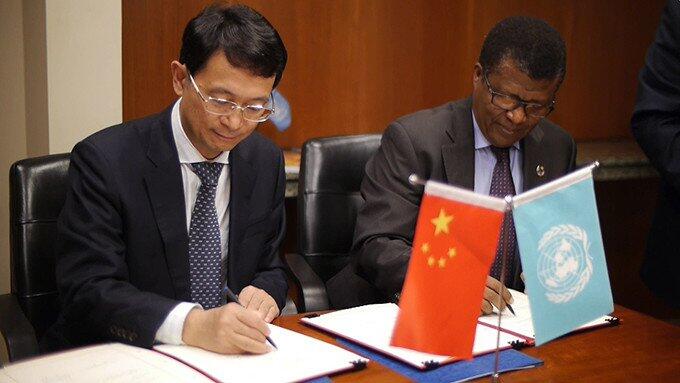A $2 million commitment from the People’s Republic of China will harness the power of South-South cooperation to reduce maternal deaths and prevent and treat cervical cancer in Sierra Leone.
Over the course of the two-year project, to be implemented in Sierra Leone’s Western Area province, UNFPA and the Sierra Leone Ministry of Health and Sanitation will partner with a Chinese national institution with relevant expertise to improve the quality of emergency obstetric care services for women with high-risk pregnancies. Despite above average rates of skilled attendance at birth and institutional delivery in Sierra Leone, maternal mortality remains high, pointing to the need to improve service quality.
The project will also establish robust services for prevention, screening and treatment of cervical cancer, the most frequent cancer among women in Sierra Leone. While the Government has begun to roll out such services, they have been limited due to lack of funding. The new project will apply good practices for early detection and treatment that can make cervical cancer a highly preventable and survivable disease.
Working in line with Sierra Leone’s National Health Strategy and through established national coordination mechanisms, UNFPA and the Chinese institution – to be selected as the project gets under way – will provide technical support and facilitate the exchange of expertise. Innovations, good practices and lessons learned will be documented, with a view to replicating them elsewhere and scaling them up.
Exchanging expertise to advance sustainable development
Signed on 29 October in New York, the agreement builds on UNFPA’s substantial history of supporting the Government of Sierra Leone in its efforts to improve women’s health, including at the time of the Ebola epidemic.
At the same time, it continues a longstanding collaboration with China, which both parties expressed an intention to enhance – in both development work and, going forward, humanitarian assistance as well.
Speaking at the signing, Deng Boqing, Vice-Chair of the China International Development Cooperation Agency (CIDCA), the government agency in charge of China’s development cooperation and humanitarian assistance, stressed the importance of UNFPA’s mandate and acknowledged the organization’s support, since 1979, in the areas of women’s health, gender equality and population data in China itself.
UNFPA Deputy Executive Director Dereje Wordofa noted that there is a lot UNFPA can learn from China. He highlighted China’s strong role in promoting South-South cooperation and contributing its own expertise and experience to advance other countries’ development.
“China has made remarkable progress in reducing maternal deaths,” he said. “Its experience and proven practices can be shared with other developing countries, especially in Africa, that are confronted with the challenge of high maternal mortality.”
The funding for the Sierra Leone project was granted under China’s $3 billion South-South Cooperation Assistance Fund (SSCAF), established following the 2015 UN Sustainable Development Summit to foster exchange among developing countries, as a means of implementing the Sustainable Development Goals. The SSCAF received additional funding in 2017 under the framework of China’s Belt and Road Initiative for investment in infrastructure and development.
“China is very committed to the achievement of the 2030 Agenda for Sustainable Development through South-South Cooperation,” said Mr. Deng.


